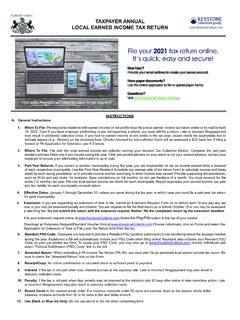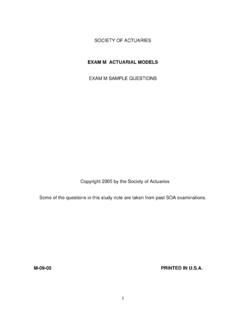Transcription of Doing Business in Canada – GST/HST Information for Non ...
1 ! Doing Business in Canada GST/HST Information for Non-Residents RC4027(E) his guide explains how the Canadian goods and services tax/harmonized sales tax ( GST/HST ) applies to non-residents Doing Business in Canada . It provides guidelines to help you determine whether you are carrying on Business in Canada , Information on GST/HST registration requirements, and instructions on how to charge, record, calculate, and remit GST/HST . It also provides detailed Information about GST/HST as it applies to specific Business activities carried on by non-residents of Canada . Note All references to dollar amounts are in Canadian dollars. For more Information , see Guide RC4022, General Information for GST/HST Registrants. GST/HST and Quebec In Quebec, Revenu Qu bec administers GST/HST . If the physical location of your Business is in Quebec, contact Revenu Qu bec at 1-800-567-4692 (from Canada or the United States) or 1-418-659-4692 (from outside Canada or the United States).
2 Also, see the Revenu Qu bec publication IN-203-V, General Information Concerning the QST and the GST/HST , available on their Web site at Rate Change Effective January 1, 2008, the GST rate is reduced from 6% to 5% and the HST rate from 14% to 13%. Foreign Convention and Tour Incentive Program Effective April 1, 2007, the Foreign Convention and Tour Incentive Program (FCTIP) replaces the Visitor Rebate Program. Under the FCTIP, non-registered, non-resident tour operators, businesses, organizations, and individuals can claim a rebate for the GST/HST paid on short-term or camping accommodation purchased and then sold in eligible tour packages. As well, a rebate is still available to sponsors and non-registered organizers of foreign conventions and to exhibitors attending domestic or foreign conventions. For more Information , see Booklet RC4160, Rebate for Tour Packages, Foreign Conventions, and Non-Resident Exhibitor Purchases.
3 Intangible personal property (IPP) The rules that zero-rate supplies of IPP made to non-residents who are not registered have been broadened. For more Information , see GST/HST Info Sheet GI-034, Exports of Intangible Personal Property and Exported intangible personal property on page 21. If you have a visual impairment, you can get our publications in braille, large print, or etext (CD or diskette), or MP3. For more Information , visit our Web site at or call 1-800-959-2221. La version fran aise de ce guide est intitul e Renseignements sur la TPS/TVH pour les non-r sidents qui font affaire au Canada . Is this guide for you? T What s new 3 Page Page Definitions .. 4 What is GST/HST ?.. 4 Who pays GST/HST ?.. 4 Who charges GST/HST ?.. 5 Taxable goods and 5 Goods and services taxable at 5% or 13%.. 5 Zero-rated goods and services.
4 5 Exempt goods and 5 Determining resident and non-resident status in Canada .. 5 5 Persons other than individuals .. 6 Permanent establishment .. 6 Are you carrying on Business in Canada ?.. 6 Meaning of carrying on 6 Meaning of carrying on Business in 6 Should you register?.. 7 Small supplier .. 7 Voluntary 7 Business 8 Security deposit .. 8 Foreign conventions .. 8 Calculating your net 8 Input tax credits (ITCs) .. 8 Simplified accounting 10 Simplified method to calculate input tax 10 Quick Method of 11 Filing your GST/HST 11 Reporting periods .. 11 Filing and remitting due 12 Filing nil returns .. 12 Completing your GST/HST return .. 12 How to file your GST/HST return .. 13 Who has to make instalment payments?.. 13 Fiscal years beginning after 2007 .. 13 Fiscal years beginning before 2008.
5 13 Penalties and 13 Penalties .. 13 13 Books and 14 Goods and services imported into 14 Goods .. 14 Temporarily imported conveyances .. 15 Imports by exporters of processing services .. 15 Goods imported by mail or courier .. 16 Rebate and refund procedures .. 16 Services and intangible personal property .. 16 Mail or courier imports of prescribed 17 Prescribed publications .. 17 Soliciting 17 Customs processing of publications imported by mail .. 18 Bulk shipments of direct mail publications .. 18 Bulk shipments not individually addressed and not sent by mail or 18 Casual 19 19 Exports from 19 Proof of residency and GST/HST registration status .. 19 Goods .. 19 Services .. 20 Exported intangible personal property.
6 21 Intellectual property .. 21 Foreign 22 Supplies bought by non-registered foreign carriers .. 22 Emergency repair services .. 22 22 Drop-shipments to registered persons .. 22 Drop-shipments to non-registered persons .. 23 Transfer of goods to a carrier or 23 Goods kept by registered suppliers .. 23 Goods subsequently exported .. 24 Events and supplies that do not qualify for the drop-shipment rules .. 24 GST/HST 24 Rebate for exported goods .. 24 Production of artistic works for export .. 24 Installation 24 Foreign Convention and Tour Incentive Program .. 24 Questions and 24 Example of an assignment of rights 27 Non-taxable 27 Tax services 31 For more 32 Table of contents 4 Calendar quarter means a period of three consecutive calendar months ending on the last day of any of the following months: March, June, September, and December.
7 Calendar year means a year that starts on January 1 and ends on December 31. Commercial activity means any Business or adventure or concern in the nature of trade carried on by certain persons, but does not include: ! the making of exempt supplies; or ! any Business or adventure or concern in the nature of trade carried on without a reasonable expectation of profit by an individual, a personal trust, or a partnership where all the members are individuals. Commercial activity also includes a supply of real property, other than an exempt supply, by any person, whether or not there is a reasonable expectation of profit, and anything done in the course of making the supply or in connection with the making of the supply. Exempt supplies are goods and services that are not subject to GST/HST . GST/HST registrants cannot claim input tax credits to recover the GST/HST they paid or owe on expenses related to such supplies.
8 Fiscal year is the tax year of the person, or where a person has elected to change their fiscal year, the period that the person elected to be their fiscal year. Input tax credit (ITC) means a credit GST/HST registrants can claim to recover the GST/HST they paid or owe for goods or services they acquired, imported into Canada , or brought into a participating province for use, consumption, or supply in the course of their commercial activities. Participating provinces means the provinces of Nova Scotia, New Brunswick, or Newfoundland and Labrador. It includes the offshore areas of Nova Scotia and Newfoundland where offshore activities are carried on in those areas. The 13% HST rate is used in the participating provinces (5% federal part and 8% provincial part.) Person means an individual, a partnership, a corporation, the estate of a deceased individual, a trust, or any organization such as a society, a union, a club, an association, or a commission.
9 Public institution means a registered charity for income tax purposes that is also a school authority, public college, university, hospital authority, or a local authority determined to be a municipality. Public service body means a registered charity for income tax purposes, non-profit organization, municipality, school authority, hospital authority, public college, or university. Registrant means a person that is registered or has to be registered for GST/HST . Small supplier refers to a person whose worldwide taxable supplies were equal to or less than $30,000 ($50,000 for public service bodies) in a calendar quarter and over the last four consecutive calendar quarters. For detailed Information on how to calculate the small supplier threshold, see Small supplier on page 7. Supply means the provision of property or a service in any way, including sale, transfer, barter, exchange, licence, rental, lease, gift, and disposition.
10 Taxable supplies are goods and services that are supplied in the course of a commercial activity and are subject to GST/HST (including zero-rated supplies). Zero-rated supplies are goods and services that are taxable at the rate of 0%. This means there is no GST/HST charged on the supply of these goods and services, but GST/HST registrants can claim ITCs for the GST/HST they paid or owe on purchases and expenses made to provide them. oods and services tax (GST) is a tax that applies on most supplies of goods and services made in Canada . GST also applies to intangible property such as trademarks, rights to use a patent, digitized products downloaded from the Internet and paid for individually, and most options to purchase property. The three participating provinces (Nova Scotia, New Brunswick, and Newfoundland and Labrador) harmonized their provincial sales tax with GST to create the harmonized sales tax (HST).

